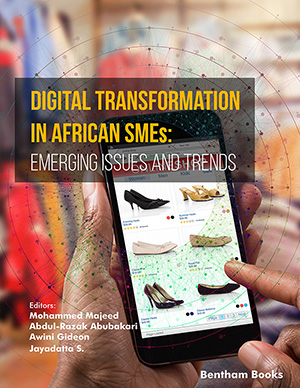Book Volume 3
Preface
Page: ii-ii (i)
Author: Mohammed Majeed, Abdul-Razak Abubakari, Awini Gideon and Jayadatta S.
DOI: 10.2174/9789815223378124030002
Electronic Commerce For SME's Success In Developing Countries. A Focus On Africa
Page: 1-15 (15)
Author: Mohammed Abdul-Basit Fuseini* and Mohammed Majeed
DOI: 10.2174/9789815223378124030004
PDF Price: $15
Abstract
The scope of e-commerce is continuously growing, touching more and more
platforms, gadgets, sectors, and marketplaces. The aim of this chapter is to identify
electronic commerce areas for SMEs’ success in developing countries like Africa. Ecommerce can be primarily business-to-business or business-to-customers. The success
of SMEs’ e-commerce adoption is based on virtual reality, augmented reality, social
media, and analytics. One important piece of advice for small and medium-sized
business owners is to start using social media and build websites to market their goods.
SMEs’ owners in Ghana have the opportunity to foster economic growth and social
progress through providing jobs, social services, and welfare to local communities.
The Nexus Between Digital Transformation and SME Performance: The Perspective of Developing Economies
Page: 16-29 (14)
Author: Stephen Mahama Braimah*, Mahmoud Abdulai Mahmoud, Awini Gideon and Bright Kwame Owusu
DOI: 10.2174/9789815223378124030005
PDF Price: $15
Abstract
M-commerce, or mobile commerce, is transforming how business is done
online in the modern era of business. Unfortunately, Ghana's “small and medium-sized
enterprises (SMEs)” do not use mobile commerce very much. This study aims to assess
the body of knowledge on the issues, preventing SMEs from adopting m-commerce
and to further the investigation into those issues. The results illustrate how unstable
variables are when seen in terms of how they affect one another, their connections, and
themselves. The components of the proposed framework are discussed, and the way
they interact with one another emphasizes how difficult it is to prevent m-commerce
adoption. This outcome emphasizes the importance of thorough data analysis as
opposed to problem isolation. The results also showed that “perceived risk” was a
significant barrier, highlighting the possibility that different perspectives on the
adoption concept may have a significant impact on the result and the existence of
additional factors.
Challenges of SMEs Adoption of Big Data in Africa
Page: 30-39 (10)
Author: Mohammed Majeed*, Abdul-Mumin Khalid, Jonas Yomboi and Kwasi Nkayi
DOI: 10.2174/9789815223378124030006
PDF Price: $15
Abstract
Many small and medium-sized enterprises (SMEs) today exploit big data
despite having insufficient resources to do so. The literature is clear that huge
corporations throughout the world are increasingly adopting Big Data Analytics as a
means of gaining a strategic edge. However, the literature shows that SMEs are not
using this technology to its full potential due to factors including a lack of experience
and the associated costs. The goal of this article is to examine the difficulties SMEs
have when utilizing big data in Africa. The study's findings pointed to a lack of
funding, clear information, complicated data, advanced big data analytics tools, reliable
infrastructure, compelling business propositions, clear data privacy and culture norms.
Big data analytics by SMEs help them face and overcome obstacles and reap the
benefits of BD to boost their competitive edge and, ultimately, the economy of their
country and Africa as a whole.
Exploring Email Marketing Among Small and Medium Enterprises
Page: 40-54 (15)
Author: Amin Ayarnah*
DOI: 10.2174/9789815223378124030007
PDF Price: $15
Abstract
The use of digital channels by Small and Medium Enterprises (SMEs) for
consumer engagement is changing as a result of advancements in information and
communication technologies and subsequent adoptions, notably by customers.
According to market research, marketers continue to trust email marketing more than
conventional digital marketing. Few studies have been done on email marketing and
how SMEs may use it to succeed as a business, and those that have been done, have all
been in developed nations with well-established telecommunications infrastructures.
This book chapter aims to investigate email marketing among SMEs in attaining
business success in order to fill the knowledge gap and expand the body of information
already existing in this field. By synchronizing the use of particular marketing tools
and resources, such as email marketing, SMEs can maintain the competitive edge of an
existing product(s). By sending emails to current or future clients, email marketing aids
in the promotion of any business online. However, SMEs must be aware of the
numerous challenges and complexity around General Data Protection Regulation
(GDPR) compliance in order to help SMEs adhere to email and data compliance
required for business relationships built on trust and data protection and privacy.
Factors Influencing the Adoption of Big Data amongst SMEs in Africa
Page: 55-75 (21)
Author: Mohammed Majeed*, Abdul-Mumin Khalid, Sulemana Ibrahim and Alhassan F.
DOI: 10.2174/9789815223378124030008
PDF Price: $15
Abstract
Characteristics of big data include its ability to be both diverse and quick, as
well as trustworthy. The vast amounts of existing medical information about patients
can be analyzed using BDA methods, yielding insights that can be used to strengthen
the SME industry. The purpose of this chapter is to identify and explain factors
influencing the adoption of big data amongst SMEs in Africa. This chapter evaluates
the factors from theories and models of technology acceptance (TAM, UTAUT, TTF,
and TEO). All these models and theories are discussed along their sub-factors for
scholars and practitioners to understand big data adoption and utilization issues.
SMEs’ Use of Technology and Its Effect on the Firm
Page: 76-93 (18)
Author: Alhassan Fatawu*, Abas S., Stanley C. and Susana A.
DOI: 10.2174/9789815223378124030009
PDF Price: $15
Abstract
Globally, digitalization is changing economies and influencing how
businesses create and sell their products. It has the potential to increase creativity,
productivity, and economic growth. This chapter set out to ascertain what technological
resources are required by small business executives in order to effectively leverage IT
to boost company performance. IT has multiple benefits for SMEs/MSMEs including
essential for the development of a company, for looking into emerging markets, for
merchandise demand, for productivity and income, for staff development, and for the
use of remote techniques of labor. It is concluded that the technology has an influence
on SMEs’ performance.
Adoption of Social Media by Small and Medium Enterprises: Key Factors and Impact
Page: 94-106 (13)
Author: Alhassan Fatawu*, Abas S., Stanley C. and Susana A.
DOI: 10.2174/9789815223378124030010
PDF Price: $15
Abstract
Adopting and utilizing social media for conveying information to
stakeholders can be made possible by SMEs at little cost. There is little research on the
correlation between the use of social media and the success of SMEs, despite the fact
that access to and sharing of information is a key factor in the success of SMEs. The
purpose of this chapter is to identify and explain the motivating factors behind SMEs'
adoption and use of social media. The factors that were identified in the literature were
based on theories applied in SMEs perspective in Africa. We employed the TOE and
TAM models for the chapter. These factors included environmental, cost,
comparability, ease of use, usefulness, and relative advantage. It was concluded that
social media technology is good for SMEs to make an impact in the world of business,
hence, needs to be adopted by SMEs’ managers or owners.
Subject Index
Page: 107-113 (7)
Author: Mohammed Majeed, Abdul-Razak Abubakari, Awini Gideon and Jayadatta S.
DOI: 10.2174/9789815223378124030011
Introduction
Digital Transformation in African SMES: Emerging Issues and Trends aims to shed light on the various advantages and drawbacks of the same along with the opportunities and markets that are emerging because of digital transformation. This book provides comprehensive insights into the role of electronic commerce in the success of Small and Medium Enterprises (SMEs) in developing countries, with a specific focus on Africa (Chapter 1). Chapter 2 explores the nexus between digital transformation and SME performance, offering perspectives from developing economies. The challenges faced by SMEs in Africa regarding the adoption of Big Data are examined in Chapter 3. Chapter 4 delves into the exploration of email marketing strategies among SMEs. Additionally, the book covers factors influencing the adoption of Big Data by SMEs in Africa (Chapter 5) and investigates the use of technology by SMEs and its impact on the firms (Chapter 6). Chapter 7 focuses on key factors and impacts related to the adoption of social media by Small and Medium Enterprises. The volume provides information for educators at all levels to obtain a complete understanding of the technology-based environment that impacts teaching and commerce. It also serves as a resource for policymakers, businessmen, researchers, and university and college students, interested in digital transformation in Africa.









.jpg)


